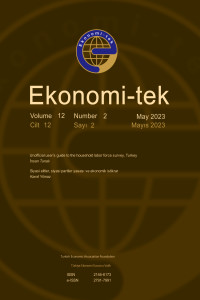Abstract
Ülkenin ilk demokratik seçiminin üzerinden 70 yıla yakın bir zaman geçmesine rağmen demokratik siyasi rekabetin en önemli sacayaklarından biri olan parti içi siyasi rekabet konusunda fazla bir yol alınamamıştır. 1980 sonrası çıkarılan siyasi partiler yasası, bugün parti içi siyasi rekabetin önündeki en büyük engeldir. Bu yasa, siyasi partileri yöneten siyasi elitlerin parti tabanı ve toplum tarafından denetlenmesini engellemektedir. 1987 – 2001 yılları arasında iktidara ortak olan partileri yöneten siyasi elitler, toplumsal ve ekonomik sorunlara çözüm üretmemelerine rağmen bu yasa sayesinde partilerinin başında kalabildiler. Kronikleşmiş kamu açıkları ve enflasyon gibi önemli ekonomik sorunların çözümü ancak 2001 krizi sonrasında ülke ekonomisinin uçurumdan dönmesi için gerekli finansmanı sağlayan uluslararası kuruluşlardan gelen baskıyla mümkün olabildi. Başarısız siyasi elitleri görevden uzaklaştıramayan birçok siyasi parti, 2002 genel seçiminde anti-demokratik seçim barajının da etkisiyle meclis dışında kaldı ve zaman içinde siyaset sahnesinden silindiler. 2023 Mayıs seçimlerinden sonra özellikle ana muhalefet partisindeki gelişmeler bu yapının sorunlarını bir kez daha hatırlattı. Aradan geçen yıllara karşın hala parti içi rekabetin önünü açamayan Türkiye’de siyasi ve ekonomik istikrar uzun vadede kalıcı olamaz.
Keywords
Ekonomi politik yaklaşım Demokratik rekabet Siyasi elitler Parti-içi rekabet Denge ve denetleme mekanizmaları.
Ethical Statement
Etik Beyan dosyasi ayrica yuklenmistir.
References
- Alesina, A. (1991). Kaufman ve Stallings üzerine yorum. R. Dornbusch ve S. Edwards (Der.) The Macroeconomics of Populism in Latin America içinde (s. 40-43). Chicago: The University of Chicago Press.
- Alesina, A. ve Drazen, A. (1991). Why are stabilizations delayed. American Economic Review, 81, 1170-87.
- Bruno, M. (1994). Kriz, istikrar programları ve ekonomik reform. İstanbul: Türk Henkel Dergisi Yayınları (çeviri).
- Çarkoğlu, A. ve Kalaycıoğlu, E. (2007). Turkish Democracy Today: Elections, Protest, and Stability in an Islamic Society. London: I. B. Tauris, February.
- Çarkoğlu, A., Erdem, T., Gençkaya, Ö. F. ve Kabasakal, M. (2000). Siyasi Partilerde Reform. İstanbul: TESEV Yayını.
- Dornbusch, R. ve Edwards, S. (Der.). (1991). The Macroeconomics of Populism in Latin America, Chicago: The University of Chicago Press.
- Gültekin, N. B. ve Yılmaz, K. (1996). Para Kurulu: Nedir, Ne Zaman Gerekir? İstanbul: TESEV Yayınları.
- Kalaycıoğlu, E. (2001). Turkish democracy: Patronage versus governance. Turkish Studies. 2 (Bahar): 54–70.
- Turan, İ. (1995). The oligarchic leadership of Turkish political parties: Origins, evolution, institutionalization and consequences. Koç University Working Paper Series. No. 1995/19.
- Yılmaz, K. (2001). Yüksek enflasyon sürecinde siyasi elitlerin rolü: Arjantin, Brezilya, İsrail ve Türkiye deneyimlerinin karşılaştırmalı analizi. İşletme ve Finans, No. 183 (Haziran), 15-36.
- Yılmaz, K., O. Cevdet Akçay, O. C. ve Alper, E. (2002). Enflasyon ve Büyüme Dinamikleri: Gelişmekte Olan Ülke Deneyimleri Işığında Türkiye Analizi. TÜSIAD Yayınları.
Abstract
Seven decades after the country's first democratic election, not much progress has been made in within-party political competition, one of the most important pillars of democratic political competition. The political parties law enacted after 1980 is the biggest obstacle to the within-party political competition today. This law prevents the political elites who govern political parties from being controlled by the party base and society. The political elites that were in power between 1987 and 2001 were able to remain at the head of their parties thanks to this law, even though they did not produce solutions to social and economic problems. Policies to tackle chronic problems such as public deficits and inflation could be implemented thanks to the pressure from international organizations that provided the financing to bring the economy from the abyss after the 2001 crisis. Political parties, that could not remove unsuccessful political elites from office, were left out of the parliament in the 2002 general election and disappeared from the political scene over time. The developments in the main opposition party since the May 2023 elections once again reminded us of the major problems caused by the existing political institutions. In the long run, political and economic stability cannot be achieved for good unless Turkey overhauls its existing political party laws.
Keywords
Political Economy Political Elites Democratic Competition Within-party competition, Checks and balances
References
- Alesina, A. (1991). Kaufman ve Stallings üzerine yorum. R. Dornbusch ve S. Edwards (Der.) The Macroeconomics of Populism in Latin America içinde (s. 40-43). Chicago: The University of Chicago Press.
- Alesina, A. ve Drazen, A. (1991). Why are stabilizations delayed. American Economic Review, 81, 1170-87.
- Bruno, M. (1994). Kriz, istikrar programları ve ekonomik reform. İstanbul: Türk Henkel Dergisi Yayınları (çeviri).
- Çarkoğlu, A. ve Kalaycıoğlu, E. (2007). Turkish Democracy Today: Elections, Protest, and Stability in an Islamic Society. London: I. B. Tauris, February.
- Çarkoğlu, A., Erdem, T., Gençkaya, Ö. F. ve Kabasakal, M. (2000). Siyasi Partilerde Reform. İstanbul: TESEV Yayını.
- Dornbusch, R. ve Edwards, S. (Der.). (1991). The Macroeconomics of Populism in Latin America, Chicago: The University of Chicago Press.
- Gültekin, N. B. ve Yılmaz, K. (1996). Para Kurulu: Nedir, Ne Zaman Gerekir? İstanbul: TESEV Yayınları.
- Kalaycıoğlu, E. (2001). Turkish democracy: Patronage versus governance. Turkish Studies. 2 (Bahar): 54–70.
- Turan, İ. (1995). The oligarchic leadership of Turkish political parties: Origins, evolution, institutionalization and consequences. Koç University Working Paper Series. No. 1995/19.
- Yılmaz, K. (2001). Yüksek enflasyon sürecinde siyasi elitlerin rolü: Arjantin, Brezilya, İsrail ve Türkiye deneyimlerinin karşılaştırmalı analizi. İşletme ve Finans, No. 183 (Haziran), 15-36.
- Yılmaz, K., O. Cevdet Akçay, O. C. ve Alper, E. (2002). Enflasyon ve Büyüme Dinamikleri: Gelişmekte Olan Ülke Deneyimleri Işığında Türkiye Analizi. TÜSIAD Yayınları.
Details
| Primary Language | Turkish |
|---|---|
| Subjects | Macroeconomics (Other) |
| Journal Section | Review |
| Authors | |
| Publication Date | November 2, 2023 |
| Published in Issue | Year 2023 Volume: 12 Issue: 2 |

